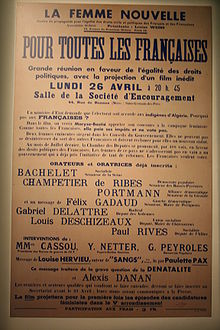Les femmes nouvelles
- View a machine-translated version of the Swedish article.
- Machine translation, like DeepL or Google Translate, is a useful starting point for translations, but translators must revise errors as necessary and confirm that the translation is accurate, rather than simply copy-pasting machine-translated text into the English Wikipedia.
- Consider adding a topic to this template: there are already 223 articles in the main category, and specifying
|topic=will aid in categorization. - Do not translate text that appears unreliable or low-quality. If possible, verify the text with references provided in the foreign-language article.
- You must provide copyright attribution in the edit summary accompanying your translation by providing an interlanguage link to the source of your translation. A model attribution edit summary is
Content in this edit is translated from the existing Swedish Wikipedia article at [[:sv:Les femmes nouvelles]]; see its history for attribution. - You may also add the template
{{Translated|sv|Les femmes nouvelles}}to the talk page. - For more guidance, see Wikipedia:Translation.

Les femmes nouvelles ("The New Women") was a women's organisation in France that was founded in 1934.[1]
Its purpose was to work for the introduction of women's suffrage. It was founded by Louise Weiss, who became its chair. The association was founded because of what was perceived as the passivity of the contemporary women's movement and politicians in France in the issue of women's suffrage.
The association was in contrast to organize and participate in intense demonstration and actions for women's suffrage during the 1930s. It arranged a number of public actions, which attracted considerable attention. However, the activity did not result in the introduction of women's suffrage because of the strong resistance toward the reform in the French Senate.
The struggle of suffrage was abruptly interrupted by the outbreak of the Second World War and the invasion and the occupation of France. Women's suffrage was introduced after the 1944 liberation of France.
References
- ^ Jean-Louis Debré et Valérie Bochenek, Ces femmes qui ont réveillé la France, Paris, Arthème Fayard, 2013, (ISBN 978-2-213-67180-2)










